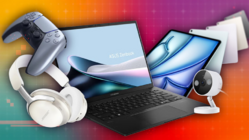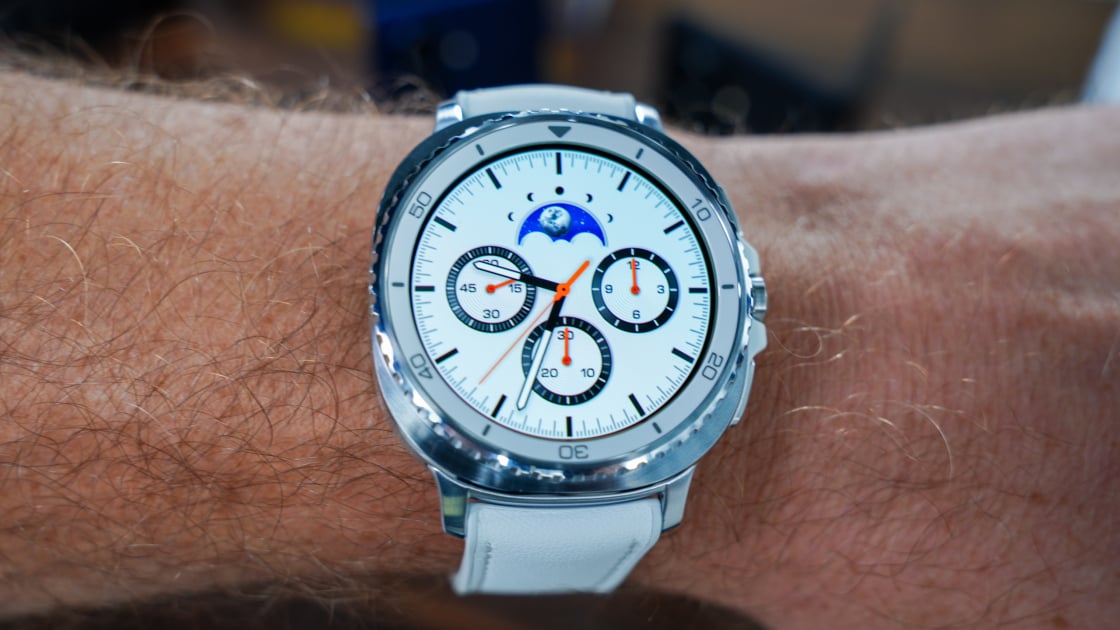The Samsung Galaxy Watch 8 just made its debut at Samsung’s Galaxy Unpacked event, alongside the Galaxy Watch 8 Classic and a new lineup of Galaxy Z 7 foldable phones. Touting a thinner design and a bigger battery than its predecessor, the Galaxy Watch 8 doubles down on the AI health guidance launched on last year’s Galaxy Watch 7 with features like antioxidant detection, personalized fitness plans, and more detailed sleep recommendations.
We got our hands on both new watches, which are available for preorder now and hit store shelves on July 25. Read on for our first impressions.
Price: More Expensive Than the Last Generation
The Galaxy Watch 8 is getting a price bump over the Galaxy Watch 7. Last year’s model started at $299.99, matching its predecessor, the Galaxy Watch 6. The Watch 8 starts at $349.99 for the 40mm version or $379.99 for the 44mm version. Both sizes also have an LTE version for an extra $50. The prices generally match the different versions of the Pixel Watch 3 (starting at $349) and still undercut the Apple Watch Series 10 (which starts at $399).
Galaxy Watch 8 (Credit: Eric Zeman)
The Galaxy Watch 8 Classic comes in one 46mm size starting at $499.99, with the LTE version again costing an extra $50. Samsung last updated the Classic series two years ago, and the Watch 6 Classic started at $399.99. Samsung is also rolling out a new titanium blue finish for last year’s Galaxy Watch Ultra and keeping the price of that model the same at $649.99.
All Watch 8 series models are launching with Samsung’s One UI 8 Watch software, so they will have access to all of the same AI-powered features. The Galaxy Watch Ultra will also benefit from all of One UI 8’s upgrades, which will provide the interface on top of Google’s updated Wear OS 6 software base. Older Galaxy Watch models will miss out on the new AI features, even when they do receive the update.
Shop the Latest Galaxy Watch Lineup
Samsung Galaxy Watch 8
Samsung Galaxy Watch 8 Classic
Design: A Fixed or Rotating Bezel
The only differences between the Watch 8 and the Watch 8 Classic are their size and design, with the latter featuring the physical rotating bezel that the Classic series is known for.
The Watch 8 Classic has a rotating bezel (Credit: Eric Zeman)
Samsung notes that both Watch 8 models are 11% thinner than the Galaxy Watch 7 and have a 50% brighter screen.
The rotating bezel helps the Watch 8 Classic stand out and gives fans of the series what they want. Thanks to its notched bezel, it looks more like a traditional timepiece than a smartwatch, and it rotates to let you easily cycle through the user interface. It’s bulkier than the Watch 8, but in a good, heavy-duty way. While the Watch 8 feels slim and can easily vanish under a sleeve, the Watch 8 Classic is the more eye-catching option.
Battery Life: About the Same as Before
The Watch 8 and Watch 8 Classic have 8% more battery capacity than the previous generation, though Samsung reps tempered expectations on that front.
The larger capacity should allow the Watch 8 series to maintain a similar capacity to its predecessors while powering the extra features of the watches. Specifically, a rep estimated they’d last 30 hours on a charge with the always-on display enabled or 40 hours with it disabled. In our testing, the Galaxy Watch 7 lasted 22 hours with the always-on display enabled.
Health Tracking Improvements: Antioxidant Detection and AI Help
The biggest jump from the Watch 7 to the Watch 8 comes on the software side, with antioxidant detection standing out as the coolest new addition. For this test, you’ll simply put a finger on a sensor on the back of the watch, and it’ll give you a reading of your overall antioxidant levels as well as tips and habits to improve them.
While the antioxidant data could be a bit generalized at first, this is still a unique feature for a smartwatch. Antioxidant tests normally require going to the doctor and having your blood drawn, so this will certainly be a much simpler and less invasive way to get that information.
Get Our Best Stories!
Your Daily Dose of Our Top Tech News

Sign up for our What’s New Now newsletter to receive the latest news, best new products, and expert advice from the editors of PCMag.
Sign up for our What’s New Now newsletter to receive the latest news, best new products, and expert advice from the editors of PCMag.
By clicking Sign Me Up, you confirm you are 16+ and agree to our Terms of Use and Privacy Policy.
Thanks for signing up!
Your subscription has been confirmed. Keep an eye on your inbox!
You put your finger on the back of the Watch 8 to measure antioxidants (Credit: Eric Zeman)
Samsung’s watches have been well-equipped in terms of health and wellness features for years. They can even detect snoring and monitor body composition levels similar to a smart scale. Last year’s Watch 7 introduced an AI-powered holistic energy score metric and personalized wellness tips. The energy score takes into account all the key health data captured by your Samsung Watch, including your activity, exercise, sleep, and stress levels.
The Watch 8 and Watch 8 Classic bring those features forward and add a handful of other AI-powered insights. Improved sleep coaching will aim to understand your lifestyle and suggest ideal times to go to bed and wake up that work with your schedule and optimize the restfulness of your shut-eye. Your watch will issue a reminder of your bedtime suggestion up to two hours beforehand and will continue to update its recommendations as it learns your patterns over time.
AI on the watch will also help it offer specific coaching as you run. You can take a 12-minute running assessment, and it will gauge your fitness level on a scale from 1 (beginner) to 10 (pro). The AI can then create a plan if you want to prep for a larger event like a marathon. Many smartwatches from Polar and Garmin offer similar fitness tests and training guidance.
Recommended by Our Editors
The Galaxy Watch 8 series will also offer real-time feedback while you run, similar to the Workout Buddy feature coming to the Apple Watch with watchOS 26. I look forward to comparing their guidance to see which is closer to an actual personal trainer, so stay tuned.
The AI in the Watch 8 series will also measure vascular load while you sleep, with insights provided after three nights of wearing the watch. The vascular load data is meant to give you deeper insight into your current stress and fitness levels, and the Watch 8 will use that information and give specific advice for tailoring your sleep and workout routine.
Aside from its AI-powered fitness features, the Watch 8 series will have Google’s Gemini built in, allowing you to get voice-based help from a conversational AI assistant.
With the One UI 8 Watch software, you’ll also be able to group notifications by app and create a customized list of apps with prioritized notifications. A feature called Now Bar will allow you to browse your watch normally, and then quickly switch back to your current activity if you’re exercising or playing music. These One UI 8 features should roll out to older Samsung watches as they gain access to the new software. The AI features will remain exclusive to the new Watch 8 series models and the Galaxy Watch Ultra, as will vascular load and antioxidant detection.
Is New AI Enough to Warrant an Upgrade?
My biggest issue with the Galaxy Watch 7 was its underwhelming battery life, so the Watch 8 and Watch 8 Classic could be worth the premium if the minor bump in capacity makes a difference. Otherwise, the jump from the last generation to this generation will come down to the usefulness of the new AI features.
The Galaxy Watch 8 comes in two sizes (Credit: Eric Zeman)
The antioxidant detection is a helpful addition, and improved guidance for running and sleep could prove to be valuable if it’s well-tailored and specific. Samsung banked on health-related AI with the Watch 7, and we ended up preferring the cheaper $199.99 Galaxy Watch FE for its superior value, despite the fact that it was missing those insights. With a price bump from the last generation, the Galaxy Watch 8 has that much more to prove.
We plan to test the Galaxy Watch 8 and Watch 8 Classic soon, so stay tuned for our full reviews.
Our Best Editor-Vetted Prime Day Deals Right Now
*Deals are selected by our commerce team
About Andrew Gebhart
Senior Analyst, Smart Home and Wearables

I’m PCMag’s senior analyst covering smart home and wearable devices. I’ve been writing about tech professionally for nearly a decade and have been obsessing about it for much longer than that. Prior to joining PCMag, I made educational videos for an electronics store called Abt Electronics in Illinois, and before that I spent eight years covering the smart home market for CNET.
I foster many flavors of nerdom in my personal life. I’m an avid board gamer and video gamer. I love fantasy football, which I view as a combination of role-playing games and sports. Plus, I can talk to you about craft beer for hours and am on a personal quest to have a flight of beer at each microbrewery in my home city of Chicago.
Read the latest from Andrew Gebhart







